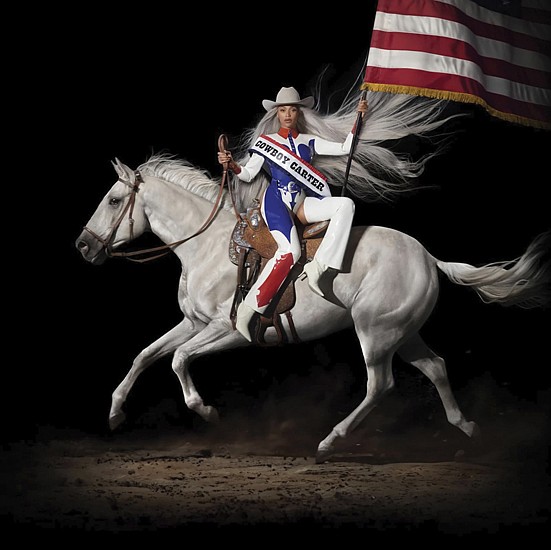Music Review: Beyoncé's epic 'Act II: Cowboy Carter' defies categorization, redefines American style
Maria Sherman-The Associated Press | 4/4/2024, 6 p.m.
LOS ANGELES
“Nothin’ really ends / For things to stay the same they have to change again,” Beyoncé sings on “Act ll: Cowboy Carter,” the opening lines of the opening track, “Ameriican Requiem.”
“Them big ideas, yeah, are buried here / Amen.”
In some ways, it is a mission statement for the epic 78-minute, 27-track release — or at the very least, functions like a film’s title card to introduce yet another blockbuster album.
In the days leading up to “Cowboy Carter,” the superstar said this “ain’t a Country album” but “a ‘Beyoncé’ album” — positioning herself in opposition to country music’s rigid power structures and emphasizing her ability to work with the style with her latest genre-defying opus.
A capital-C country album it is not — and of course it isn’t. Beyoncé is an eclecticist, known for her elastic vocal performances: in a moment, choosing to belt close to godliness and, in another, moving with marked ease into a fractured run, inheriting histories through the vowels she stresses, the handclaps she introduces and the genres she utilizes. (That’s evident in the instruments as well, which range from washboard, pedal steel, banjo, mandolin, Vibraslap, bass ukulele and mandolin, to name a few.)
If the album, five years in the making, was inspired by the racist backlash she faced after performing at the 2016 CMAs with The Chicks, as many fans have theorized, she’s eclipsed it and then some. Tell Beyoncé she isn’t welcomed in your space; she’ll carve out a bigger one.
“Ameriican Requiem” bleeds into a reimagination of a Beatles’ classic, “Blackbiird.” It was originally written by Paul McCartney about desegregation in American schools with particular emphasis on the Little Rock Nine, the first group of Black students to desegregate an Arkansas high school in 1957. In Beyoncé’s rendition, harmonies are stacked. She’s joined by Tanner Adell, Brittney Spencer, Reyna Roberts and Tiera Kennedy — some of the most exciting voices in contemporary country — who are also Black women.
They aren’t the only next generation highlighted on “Cowboy Carter:” Willie Jones’ rich Louisiana tone turns “Just for Fun” into trail-riding gospel country. Shaboozey’s country-rap marks a pivot in the album’s trajectory on “Spaghettii,” setting the listener up for the singular listening experience of the Patsy Cline channeling “Sweet Honey Buckiin’,” with its Jersey club beats.
Country veterans, too, appear: Willie Nelson is a rougharound-
the-edges radio DJ on the fictional station KNTRY — the resulting effect is an alternative America where terrestrial country radio does not overwhelmingly prefer playing white performers;
snippets of Sister Rosetta Tharpe’s “Down by the River Side,” Chuck Berry’s “Maybellene” and Roy Hamilton’s 1957 “Don’t Let Go” bled into Mr. Nelson’s smoky voice.
The ‘50s cuts are an inspired choice; Beyoncé has chosen to reference the decade in which format-based radio emerged and, as a result, country music’s racial lines were all but codified. The effects are still felt. One frequently referenced study, conducted by University of Ottawa professor Jada Watson, examined over 11,000 songs played on country radio from 2002 to 2020 and found that artists of color made up only 3% of all airplay, twothirds of which were men. In even her interludes, Beyoncé has taken her listeners to school.
“Jolene” is a reimagined take on the 1973 Dolly Parton original; it’s preceded by “Dolly P,” a spoken-word interlude from Ms. Parton. “Remember that hussy with the good hair you sang about?” she says, referencing “Becky with the good hair” from “Sorry” off 2016’s “Lemonade.” “Reminded me of someone I knew back when, except she has flaming locks of auburn hair. Bless her heart! Just a hair of a different color, but it hurts just the same.”
Beyoncé’s version, of course, is very Beyoncé — there’s no shrinking and begging for this woman to step off; it’s a warning.
Perhaps Beyoncé’s clearest predecessor on this album is Linda Martell, the first Black woman to play the Grand Ole Opry. Ms. Martell’s 1970 landmark record “Color Me Country” should be considered country canon; she offered Black women rare visibility in a genre stereotypically associated with whiteness.
She also appears twice on “Cowboy Carter,” first providing clarity on the complicated origins of country in “Spaghettii.”
It’s a massive album that will require close examination for full enjoyment — but Beyoncé fans have long learned to be great students.







